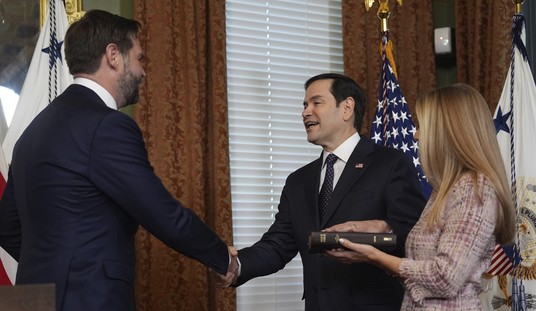I wish they wouldn’t do it either — burning books is an almost singularly offensive form of protest, needless to say — and I appreciate Petraeus’s concern for his men. But it’s hard for me to imagine him asking, say, anti-war protesters to stay home from a rally lest a public show of division among American voters give hope to the enemy. Citizens and political leaders can and should criticize or counter-protest this preacher, but if military brass are willing to start weighing rights against American blood spilled, where’s the line? I support repealing “don’t ask, don’t tell,” but if it happens, won’t media coverage of that play rather poorly in Iraq and Afghanistan? Should we maybe not do it then so as not to jeopardize any troops? Given that Republicans are more hawkish than Dems and therefore more likely to attack Iran’s nuclear program, is it the Pentagon’s opinion that we should vote Democratic this year in order to save some Air Force lives?
The U.S. commander in Afghanistan on Monday criticized a Florida church’s plan to burn copies of the Quran on September 11, warning the demonstration “could cause significant problems” for American troops overseas.
“It could endanger troops and it could endanger the overall effort in Afghanistan,” Gen. David Petraeus said in a statement issued Monday…
And one of his deputies, Lt. Gen. William Caldwell, told CNN’s “The Situation Room” that event “has already stirred up a lot of discussion and concern” among Afghans.
“We very much feel that this can jeopardize the safety of our men and women that are serving over here in the country,” said Caldwell, the head of NATO efforts to train Afghan security forces.
This is a tougher issue, I think, than it seems at first blush. My instinct on provocations is to lay off unless it’s in defense of some important liberal principle. That’s why I supported “Everybody Draw Mohammed Day,” which was a reaction to the culture of intimidation practiced by some Muslims against western blasphemers. When people like Lars Vilks and Kurt Westergaard and the “South Park” guys have to fear for their lives for drawing cartoons, solidarity in the name of free speech trumps concerns over offending Muslims who don’t participate in that culture. By Petraeus’s own admission, though, the Koran-burning incident now involves the same culture of intimidation: He’s not merely worried about hurt feelings among innocent Muslims if the Koran burns, he’s worried about U.S. troops being killed for the offense. What incentive is created (or, rather, reinforced) if the event is now called off for that reason? I heard these same arguments from the “hearts and minds” crowd during the “Everybody Draw Mohammed” kerfuffle — we must censor ourselves so as not to alienate non-violent Muslims, even though in the process we end up giving the violent ones precisely what they want — and I’m as confused as ever as to where the line is, assuming there is one. If the Koran-burners change the protest from a book-burning to some sort of shoutfest about how “Islam is the devil” or whatever, would that make it better? If so, why? When, if ever, is it acceptable to offend Muslims? On behalf of “South Park” fans everywhere, just give us some guidelines.
I could do without this rhetoric too:
The State Department described as “un-American” plans by a controversial church to burn Korans in memory of the Sept. 11, 2001, terror attacks — though the head of that church says he is not deterred.
State Department spokesman P.J. Crowley called the plan “inflammatory” at a briefing Tuesday and said it would put U.S. troops and interest around the world at risk, echoing a concern expressed by the top U.S. commander in Afghanistan.
I don’t mind government criticism of the guy while acknowledging that he has the right to proceed — that’s how most Republican pols have handled the Ground Zero mosque, after all — but “un-American” is some rhetorical grenade to lob into a situation whose closest analog is the First Amendment centerpiece of flag-burning.
So why do I wish the church would forget about it? In writing about this, you’re forever caught between the “hearts and minds” crowd who don’t want any offense given to Muslims, ever, and the crowd who thinks that Muslims are bent on cultural hegemony and therefore no concessions to their feelings can be made, ever, lest it encourage them. I’m not in either group; I want satirists and political commentators to be able to criticize without fear, but I don’t want the Zuhdi Jassers of the world to feel unwelcome. Everyone will draw the line differently — we’re dealing with symbolism here, after all, where the message is necessarily muddled — but I thought “Everybody Draw Mohammed Day” was a necessary defense of free speech aimed at a specific form of intimidation (even though it risked offending Muslims generally) whereas the Koran-burning seems unnecessary, sinister (due to the historical pedigree of book-burning), and more likely to hurt the feelings of Muslims generally than the jihadis it’s ostensibly aimed at. But your mileage may vary. Like I say, this is a tougher issue than it seems at first.
Update: A commenter below says you can’t compare anti-war protests to Koran-burning:
I think there’s a difference between boosting morale and whipping the enemy up into a frenzy by poking him with a stick.
There is a difference, but it’s a difference in degree. If whipping the enemy up means 50 more attacks on Americans and protests mean only 10 more attacks, is the latter an acceptable number while the former isn’t? Are both unacceptable? If “South Park” showing Mohammed means 10 extra attacks, does that justify self-censorship? Is there a minimum number of attacks we’re willing to tolerate? I’m not offering this as an argument against anti-war protests, mind you, just as a stark illustration of the moral calculus this sort of thinking gets you into.
Update: He wanted to get attention, and now he’s got it.
Clergy members, academics and elected officials in Gainesville have planned nearly a dozen events to counter the plan, starting on Wednesday with an interfaith prayer service. On Saturday, hundreds of local residents and visitors are expected to rally against Mr. Jones, an evangelical pastor, with signs containing messages like “Peace among religions leads to peace among nations.”
“He represents only 30 people in this town,” said Larry Reimer, a local pastor, noting the size of Mr. Jones’s church, the Dove World Outreach Center. “It needs to get out somehow to the rest of the world that this isn’t the face of Christianity.”








Join the conversation as a VIP Member